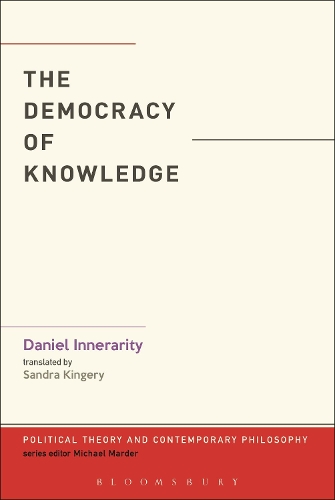
The Democracy of Knowledge
(Hardback)
Available Formats
Publishing Details
The Democracy of Knowledge
By (Author) Dr. Daniel Innerarity
Translated by Sandra Kingery
Bloomsbury Publishing PLC
Bloomsbury Academic USA
29th August 2013
United States
Classifications
Tertiary Education
Non Fiction
320.01
Physical Properties
Hardback
224
503g
Description
This volume in the Political Theory and Contemporary Philosophy series extends democracy to knowledge in two ways. First, it argues that the issues science seeks to clarify are relevant for all citizens. Second, it explains that the fundamental problems faced by any democracy, such as the economic crisis, are not so much problems of political will as cognitive failures that must be resolved through both a greater knowledge of the realities over which we govern and a fine-tuning of the tools of governance. In fact, knowledge and related fields are spheres in which not only economic prosperity, but also democratic quality, are determined. Thus politics of knowledge and through knowledge has become a question of democratic citizenship. After introducing the concept of governing knowledge, the book discusses the political action of collective organization of uncertainty, before developing the idea of the cognitive challenge of the economy, revealed by today's economic crisis. A groundbreaking work by a renowned philosopher, it will be an accessible and fundamental resource for anyone interested in the relation of power to knowledge.
Reviews
Daniel Innerarity is one of the sharpest thinkers of our times in Europe. His work is based on the most up-to-date developments in ethics, epistemology, political sociology and continental philosophy. Like Anthony Giddens, Charles Taylor and Alain Touraine, he is able to corner the dilemmas of late modernity for humankind. After thoughtful essays on the ethics of hospitality and the political contours of globalization, his latest book addresses the political and cognitive challenges of the democracy of knowledge. Going beyond both the optimism of nave democrats and nostalgics of the Enlightenment idea of unlimited technological progress who believe that surely more information and more knowledge will lead to more democracy, Innerarity argues that this is not necessarily the case. Untamed and unprocessed masses of information can lead to a paralysis of democracy. Inneraritys book attempts to delineate what governments, universities and citizens should do to make sure that a society of knowledge will also be a society that furthers its liberal democratic experiment. -- Guy Laforest, University of Laval, Canada
Author Bio
Daniel Innerarity is Professor of political and social philosophy and Ikerbasque researcher at the University of the Basque Country. A member of the Academy of Sciences and Arts in Salzburg, he was a Fellow of the Alexander von Humboldt Foundation at the University of Munich and visiting professor at the University of Paris 1-Sorbonne. He is the author of many books, including The Future and its Enemies (2012). www.danielinerrarity.es.
